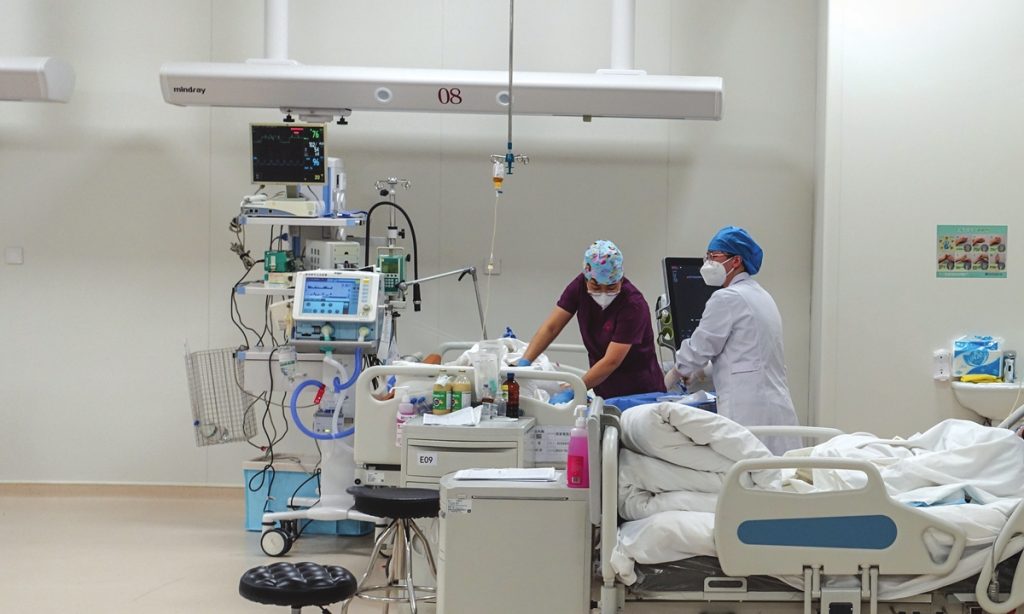176 hospital heads probed amid anti-corruption campaign in healthcare sector

China's corruption watchdog has probed 176 hospital heads over the past few weeks during a "sweeping, more vigorous than ever" anti-corruption campaign in the healthcare sector, which experts said aims to eradicate corruption in the field and restore public trust in the healthcare system.
Since China started the sweeping anti-corruption drive in the public health sector in mid-July, a total of 176 Party secretaries or heads of hospitals had been detained as of Saturday, according to media calculations.
In recent weeks, more than 20 provincial-level regions, including Shandong, Xinjiang, Tianjin and Jiangsu, have launched meetings on fighting corruption in the public health sector. Ever since the beginning of August, there have been daily reports of medical system officials being probed and removed from their positions.
For example, Shaanxi Province announced on Friday that it has received 2,521 tip-offs of medical corruption this year. A total of 937 people have been investigated and 3,470 "red envelopes" (bribes) returned.
"Leaders of our units are asked to pay home visits to middle-level cadres in key departments and conduct thorough investigations of their financial status during this anti-corruption campaign," a doctor from Southwest China's Chongqing Municipality told the Global Times on condition of anonymity.
She said doctors at the grassroots level have been unaffected by the sweeping campaign as "there are few means for frontline doctors to make illegal income."
The Third Xiangya Hospital of Central South University in Central China's Hunan Province started investigations last week after nine hospital employees reported a department head violating rules that allegedly resulted in the death of two patients.
According to the report letter, apart from the misconduct, Meng Jie, the department head, was also involved in corruption and elbowing out fellow colleagues.
The hospital responded in August 9 that it is investigating the case.
According to media reports, after a hospital head in Zhongshan, Guangdong Province, whose corruption case involves some 30 million yuan ($4.14 million), was caught in the anti-corruption drive, average costs for patients in the hospital dropped by 1,400 yuan.
Experts said that the anti-corruption campaign in the sector this year is different from previous campaigns, as it is sweeping and more vigorous than ever.
Corruption in the medical sector is a serious issue that affects the credibility of the healthcare system and patients, said Zhong Chongming, an expert from the China Health Culture Association.
Zhong said that medical corruption undermines the credibility of the healthcare system and erodes social trust. It also leads to unfair distribution of medical resources, as funds that should be used for patient treatment and improving medical facilities could be misused.
In July, the National Health Commission, the National Healthcare Security Administration, the State Administration for Market Regulation and six other government agencies launched a year-long campaign to rectify corruption in the pharmaceutical industry, according to a statement published on the health commission's website on July 21.
It stressed that the authorities will conduct in-depth and systemic governance of the pharmaceutical industry, with key figures and key links such as manufacturing, supply and sales in focus, in order to weed out corruption.
On July 28, the Central Commission for Discipline Inspection held a meeting in Beijing to prepare for the campaign.
Wei Zining, head of a Beijing-based research institute on hospital management, said that in the short term, the anti-corruption campaign has led to a slew of cancellations for medical conferences and events sponsored by pharmaceutical companies, which shows it has had a deterrence effect on pharmaceutical companies.
In the long term, it can help regulate the marketing practices of pharmaceutical companies, allowing them to focus more on product research and development, internal development, and quality improvement, said Wei, noting that it can also regulate hospital operations and management, enhancing the capacity and standards of medical services.
Multiple Chinese pharmaceutical companies such as Shanghai-based Rongsheng Biotech have recently withdrawn their applications for listings on the A-share market amid the nation's strengthened efforts to tackle corruption in the medical sector, media reported on Thursday.